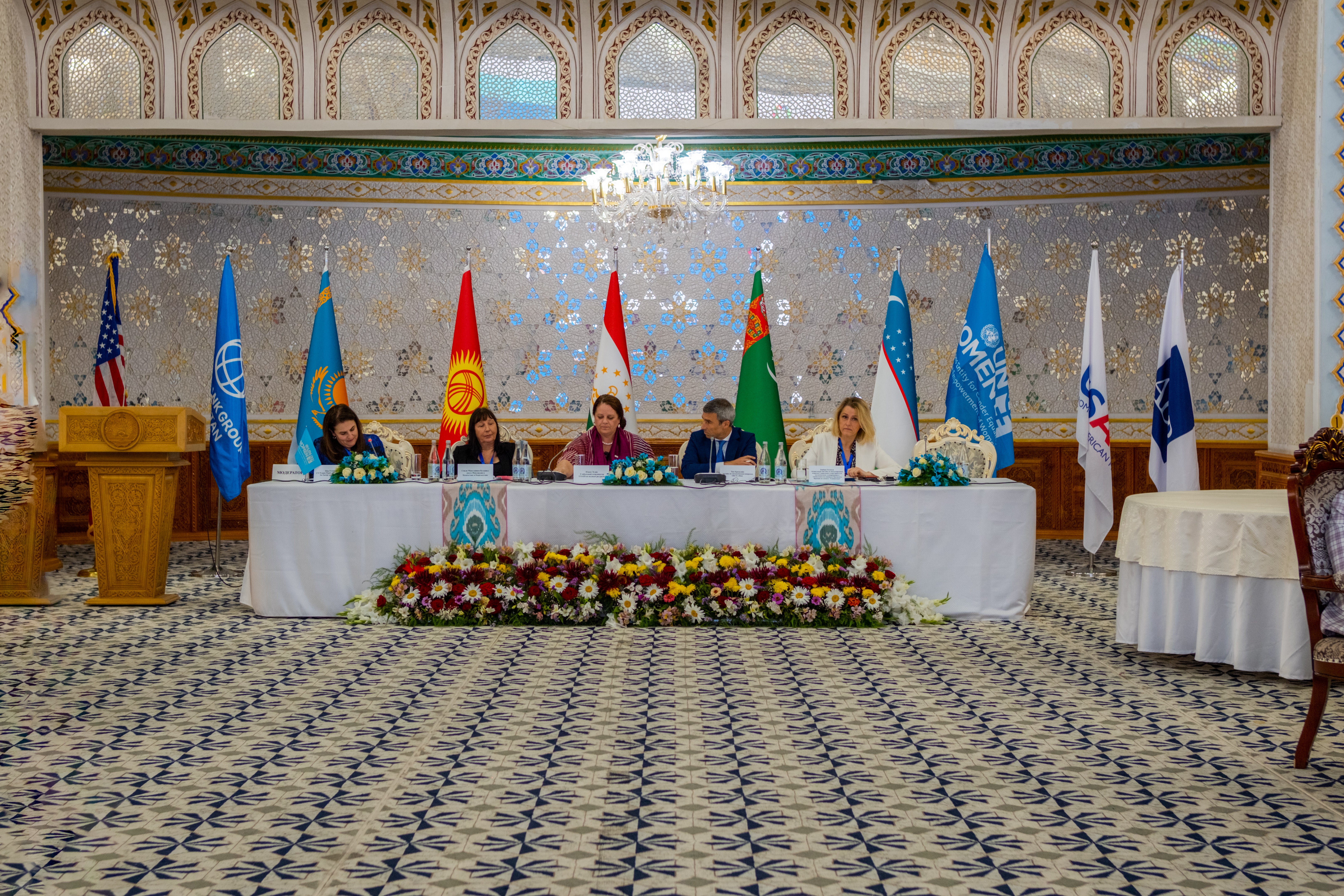Empowering Women in Water Diplomacy and Management: The International Forum "Women and Water"
Date:

10 June 2024, Dushanbe, Tajikistan - The International Forum "Women and Water" convened 180 partners from 25 countries and various sectors, including women diplomats, activists, scientists, water sector professionals as well as representatives from State agencies, grass-roots organizations and development partners in Dushanbe, Tajikistan. Held as an important side event of the Third High-Level International Conference on the International Decade for Action "Water for Sustainable Development, 2018-2028," under the Dushanbe Water Process, the Forum highlighted the pivotal role of women in water governance and management and their empowerment in decision-making processes.
The Dushanbe Water Process is an initiative of the Government of the Republic of Tajikistan, in close collaboration with the United Nations, aiming to support the goals of the International Decade for Action "Water for Sustainable Development, 2018-2028" through a series of conferences held every two years by the Government.
During the Forum, participants exchanged views and experiences on empowering women in leadership roles in water diplomacy and decision-making to contribute to human security from a gender equality perspective and to strengthen the resilience of societies to crises. At the Forum, partners underlined the need for gender-sensitive solutions and gender-responsive financing to drive transformative changes that benefit everyone.
Participants recognized that while the global water crisis requires context-specific solutions, it is fundamentally a social issue. Participants also raised significant concerns about ongoing gender disparities in political decision-making, particularly in water management. They emphasized that traditional gender roles, limited access to resources, and unsupportive policies continue to marginalize women, undermining progress towards shared and transboundary water management essential for sustainable development.
There is also a lack of recognition for women's agency, solutions, and unique experiences in water governance. This failure to acknowledge women's contributions limits the effectiveness of water management strategies and policies. Additionally, shrinking safe spaces for civil society organizations and new operational barriers complicate efforts to achieve inclusive water governance.
Research by UN Women highlights the profound gendered impacts of water scarcity, which threaten food security, health outcomes, cultural integrity, and peace. Women’s leadership and participation in water governance are crucial for developing sustainable and equitable water management systems. Gender-responsive water justice addresses these issues by promoting policies that recognize water as a basic right and consider the specific needs of women.
To address these challenges, they emphasized the need for inclusive, collaborative efforts and the importance of localized and gender-sensitive action. Achieving sustainable water management requires challenging traditional gender roles, promoting women's empowerment in governance and diplomacy, and ensuring gender-responsive legal and policy reforms.
Participants highlighted that effective water management requires inclusion, collaboration, and coordinated efforts. Promoting women's empowerment in water governance and diplomacy is fundamental. Ensuring women's equal rights, leadership, and decision-making roles is crucial, alongside building capacities, providing networking opportunities, advocating for gender-responsive reforms, and creating equal economic opportunities. Additionally, participants highlighted that encouraging women's professional networking fosters inclusive water governance. Increasing women's participation in water negotiations and empowering them to assume leadership roles ensures gender mainstreaming and capacity-building, aligning with Sustainable Development Goal (SDG) 6 and the Beijing Platform for Action (BPfA) commitments.
The forum concluded with a call for a comprehensive review of progress on the implementation of actions under the Dushanbe Water Process from 2018. The review, led by the United Nations Department for Economic and Social Affairs (UNDESA) and UN Water, alongside the Governments of Tajikistan and the Netherlands, should apply a gender lens and publicly share the findings. This review, in the context of the 2023 UN Water Conference—the first such conference in nearly 50 years—should apply a gender lens and publicly share the results. The initiative announced by Kazakhstan and France at COP28, the One Water Summit, aims to prepare for the 2026 UN Water Forum, further fostering practical actions and demonstrating gender-responsive solutions for broader replication.
By harnessing the full potential of women and girls, the "Women and Water" Forum underscored the transformative impact of inclusive water governance on society and the environment. Women's leadership and participation in water management are not just essential for achieving Sustainable Development Goal 6 but also for fostering equitable and resilient communities in the face of global water challenges. The participants shared their views and experiences on empowering women in leadership in water diplomacy and decision-making platforms to contribute to human security from a gender equality perspective and to strengthen the resilience of societies to crises. At the Forum, partners underlined the need for gender-centered solutions and gender-responsive financing to ensure transformative changes for all by leaving no one behind.
The outcome document developed during the forum was presented within the Water process by our Deputy Regional Director, Eliza Fernandez Saenz. By addressing these concerns and implementing these actions, stakeholders believe more inclusive and effective water governance can be achieved, significantly contributing to sustainable development goals.
The Outcome Document of the “Women and Water” Forum can be found here.
The “Women Water” Forum serves as a platform for women activists, practitioners in water management, gender and right-to-water experts, the expert community, and State and international development actors to present and discuss women-led practices and innovative solutions. It seeks to accelerate and gender-sensitize the implementation of internationally agreed water-related goals and targets as part of sustainable development and peace strategies at local, national, and regional levels.